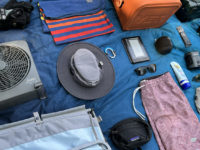The following contribution is from another author.
Hauling a heavy pack full of gear and consumables can become the most physically grueling part of any adventure. Complete packs for a multi-day hike can easily exceed 50 pounds, and that is just for one person. Ultralight backpacking offers an alternative to the strain. Ultralight packs generally run from 10-25 lbs in base weight (which is the weight of all non-consumable items). If cutting down on the overall weight of your pack isn’t enough incentive to give ultralight a try, here are four other reasons to help convince you.
1. Leave No Trace Gets Easier
When you are carrying less gear, your impact on your surroundings can be substantially less. For starters, there is less waste. Ultralight backpacking will require you to cut down your gear to the bare essentials. Second, for overnight trips, ultralight tents are often easier to set up and leave less of a mark on the ground than more conventional models. Many hikers opt for hammocks or hammock tents to further reduce the weight and environmental impact. As with any type of backpacking, be sure to pack out everything you bring in, including trash.
2. Get Some Upgraded Gear
Conventional backpacking gear isn’t always made with weight in mind. If you’re like Jeffrey Previte, the CEO turned mountain climber, you may know well how much that gear can weigh on you overtime. However, you can find lightweight versions of most necessities. As you take a look at the possibilities, you may find that tents, camping stoves, water containers, ropes, climbing gear, and even tools may all end up on your upgrade list. In addition to saving valuable ounces with each new item, there’s also the unbeatable excitement of having new gear. Consider donating old gear to a gear recycling program to reduce your carbon footprint and help newer hikers get off to a good start.
3. Explore More Adventure Options
Ultralight backpacking opens up new adventure opportunities. With less weight and smaller packs, you may find that you are able to more easily access remote areas and trails. Where a larger pack may have kept you from following that deer path or going as far down the trail as you wanted, an ultralight pack may give you the extra agility and energy that you need. A lighter pack means you can also travel further, including hopping on a plane or train to get to your next destination.
4. Practice New Camping & Hiking Skills
Heading out with less gear means making decisions on what gets included and what gets left behind. It also means being prepared to handle situations with less. For example, encountering an emergency when you’ve pared down your first aid kit may mean getting inventive with your medical supplies. Cutting out books and other entertainment items may mean learning to be at peace with the quiet and stillness of nature.
Ultralight backpacking requires more careful planning and preparation than conventional backpacking, but it can come with easier trips, new access, and new skills to take your trip to the next level. Consider what gear you absolutely cannot travel without, upgrade existing items to lightweight versions, and make sure you have the skills necessary to survive with less. May each ounce that you save come with a pound more of adventure.
















